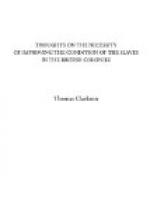The above account is far beyond any thing that could have been expected. Indeed, it is most gratifying. We find that the liberated Negroes, both in the South and the West, continued to work upon their old plantations, and for their old masters; that there was also a spirit of industry among them, and that they gave no uneasiness to their employers; for they are described as continuing to work as quietly as before. Such was the conduct of the Negroes for the first nine months after their liberation, or up to the middle of 1794. Let us pursue the subject, and see how they conducted themselves after this period.
During the year 1795 and part of 1796 I learn nothing about them, neither good, nor bad, nor indifferent, though I have ransacked the French historians for this purpose. Had there, however, been any thing in the way of outrage, I should have heard of it; and let me take this opportunity of setting my readers right, if, for want of knowing the dates of occurrences, they should have connected certain outrages, which assuredly took place in St. Domingo, with the emancipation of the slaves. The great massacres and conflagrations, which have made so frightful a picture in the history of this unhappy island, had been all effected before the proclamations of Santhonax and Polverel. They had all taken place in the days of slavery, or before the year 1794, that is, before the great conventional decree of the mother country was known. They had been occasioned, too, not originally by the slaves themselves, but by quarrels between the white and coloured planters, and between the royalists and the revolutionists, who, for the purpose of reeking their vengeance upon each other, called in the aid of their respective slaves; and as to the insurgent Negroes of the North, who filled that part of the colony so often with terror and dismay, they were originally put in motion, according to Malenfant, under the auspices of the royalists themselves, to strengthen their own cause, and to put down




